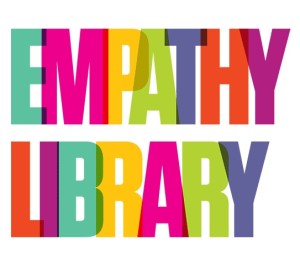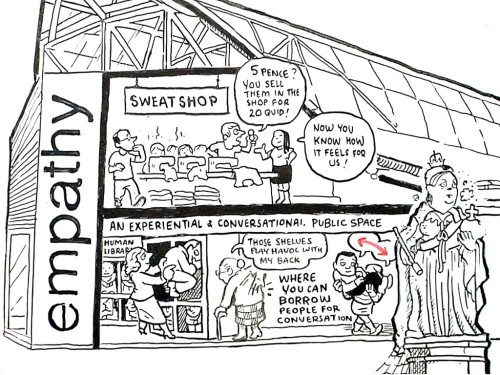I recently came across a powerful, short video called This is Adam, about a homeless guy living on the streets of San Francisco. He had all sorts of interesting and insightful things to say, amongst them this: ‘I notice every day that people everywhere are losing their compassion and empathy – not just for homeless people but for society in general.’ What’s really striking is that we see the world as if through Adam’s eyes, including how people ignore him as they pass by. Continue reading
Author: Roman Krznaric
Who are the five greatest empathy heroes of all time?
Who are the greatest empathy heroes of all time? I’ve looked through the history books and come up with my top five. OK, you know St Francis of Assisi, but what about Gunther Walraff, Beatrice Webb or John Howard Griffin? You can find out all about them in my new article at YES! Magazine.
I’ve been rather busy with my electronic pen and have written another article, in Time Magazine, on five ways to be more empathic. My advice ranges from chatting to your local barista to introducing empathy tests in the office and getting babies to teach your kids how to step into other people’s shoes.
These articles are based on my book just published in the US, Empathy: Why It Matters and How to Get It.
Empathy: Why It Matters, and How to Get It
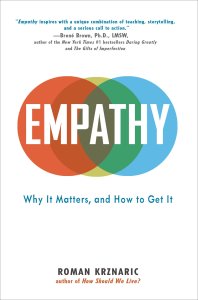 ‘Empathy inspires with a unique combination of teaching, storytelling, and a serious call to action.’ – Brené Brown, author of the New York Times # 1 Bestseller Daring Greatly
‘Empathy inspires with a unique combination of teaching, storytelling, and a serious call to action.’ – Brené Brown, author of the New York Times # 1 Bestseller Daring Greatly
I’m delighted to announce that my book Empathy: Why It Matters, and How to Get It, has just been published in the US by Penguin Books (it has been published in the UK under the title Empathy: A Handbook for Revolution).
The book describes how empathy – the art of stepping into the shoes of another person and looking and the world through their eyes – can improve our relationships, boost our creativity and tackle social issues from racial prejudice to violent conflicts.
Drawing on over 10 years of research, you will learn about human libraries, how babies can teach empathy, and discover the six habits of highly empathic people.
As part of the launch of the book, I’m also announcing creation of the world’s first Empathy Museum, an experiential adventure space for taking imaginative journeys into other people’s lives. Please visit the Emathy Museum website and watch the two-minute video, Step Into the Empathy Museum.
Empathy Library Competition
You may have heard about the online Empathy Library I founded a few months ago. It’s been fantastic to watch it grow. It received over 100,000 visits in its first few weeks of life, and now contains reviews of hundreds of books and films which have been entered by its thousands of users. Anyone can join and add their favourites.
Continue reading
Welcome to the Festival of Love
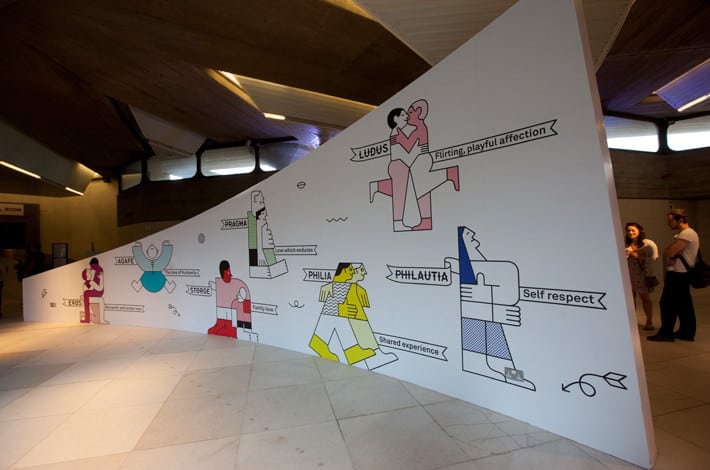 I was recently at London’s Southbank Centre for the launch of their fabulous summer Festival of Love. What made the occasion particularly special for me was that the two-month festival, running throughout July and August, has been based around the different varieties of love in Ancient Greece that appear in my book The Wonderbox. To set the scene I gave the opening talk on these forgotten approaches to the art of loving, discussing eros (sexual passion), philia (friendship), storge (familial love), pragma (mature love), ludus (playful love), agape (selfless love) and philautia (self-love). Continue reading
I was recently at London’s Southbank Centre for the launch of their fabulous summer Festival of Love. What made the occasion particularly special for me was that the two-month festival, running throughout July and August, has been based around the different varieties of love in Ancient Greece that appear in my book The Wonderbox. To set the scene I gave the opening talk on these forgotten approaches to the art of loving, discussing eros (sexual passion), philia (friendship), storge (familial love), pragma (mature love), ludus (playful love), agape (selfless love) and philautia (self-love). Continue reading
In Ronald Duncan’s Writing Hut
 I am sitting in a tiny, sparse stone hut at the top of a North Devon cliff, overlooking the sea. Outside is an enticing sign: ‘Ronald Duncan’s Writing Hut is Open’. This is where the West Country poet and playwright – best known for writing the libretto for Benjamin Britten’s opera The Rape of Lucretia – used to spend his working days. Continue reading
I am sitting in a tiny, sparse stone hut at the top of a North Devon cliff, overlooking the sea. Outside is an enticing sign: ‘Ronald Duncan’s Writing Hut is Open’. This is where the West Country poet and playwright – best known for writing the libretto for Benjamin Britten’s opera The Rape of Lucretia – used to spend his working days. Continue reading
Let’s base World Cup teams on star sign and shoe size!

As football fever envelops the planet, with all eyes turned towards Brazil, I want you to imagine a different World Cup. Each country sends their national team as usual, but then all the players are pooled together and divided into teams based on their astrological star sign. So Virgos play Leos, and Aquarians are pitted against Aries, with each team having players from a mix of countries. Who would win overall? Perhaps the power of Taurus, the bull, would be no match for the sharp sting of Scorpio. We might imagine other World Cups, where teams are based on shoe size – the clodhopping size elevens against the nimble-toed eights – or maybe the favourite colour of each player. Continue reading
The World’s First Empathy Museum
One of my ambitions is to found the world’s first Empathy Museum – an experiential and conversational adventure space for stepping into other people’s shoes. I’ve just written an article at the Virgin Unite blog where I describe my vision for the museum as both a physical space and a digital community. You might, for instance, encounter a Human Library where you borrow people (instead of books) for conversation, or a Sweatshop where you make clothing under the working conditions of sweatshop labourers in developing countries.
And here’s some great news. Not only have we recently held a fantastically creative ‘hack weekend’ with students from the Royal College of Art in London, designing prototype exhibits – we’ve also received seed funding to help turn the Empathy Museum into a reality. So the journey starts here.
Do check out the article, and share below any ideas you may have for exhibits that should be part of the Empathy Museum.
Why The Empathy Critics Are Wrong: Empathy Doesn’t Break Democracy, It Makes It
You can always tell when a new idea is becoming popular – people start critiquing it. That’s certainly the case when it comes to empathy, a concept that is getting more public attention today than at any point in its history (the frequency of Google searches for the word ’empathy’ has more than doubled in the past decade). Continue reading
6 Ways to Teach Yourself Empathy
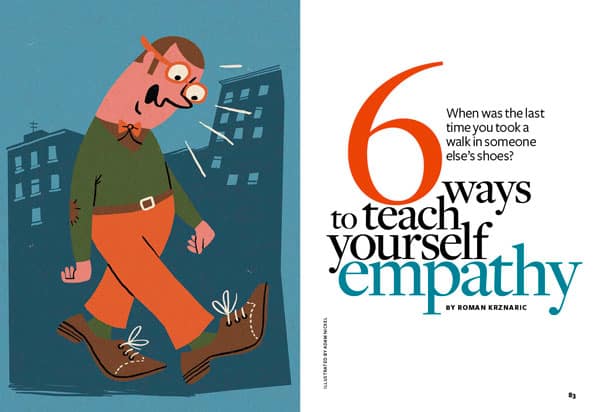 ‘Do not do unto others as you would have them do unto you,’ wrote George Bernard Shaw, ‘they might have different tastes’. This and other ideas for teaching yourself empathy appear in this new article in Readers Digest magazine. You’ll also find some advice from one of my heroes, the American oral historian Studs Terkel, who I rate as one of the greatest conversationalists of the 20th century: ‘Don’t be the examiner, be the interested enquirer.’
‘Do not do unto others as you would have them do unto you,’ wrote George Bernard Shaw, ‘they might have different tastes’. This and other ideas for teaching yourself empathy appear in this new article in Readers Digest magazine. You’ll also find some advice from one of my heroes, the American oral historian Studs Terkel, who I rate as one of the greatest conversationalists of the 20th century: ‘Don’t be the examiner, be the interested enquirer.’
Roman Krznaric’s new book, Empathy: A Handbook for Revolution, is published by Random House.

